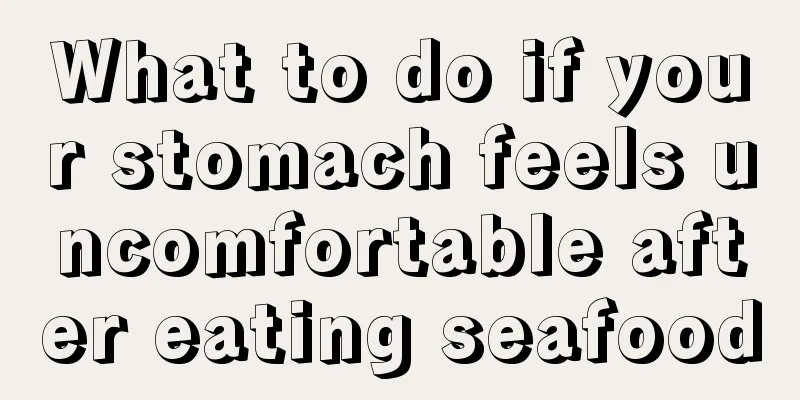What to do if your stomach feels uncomfortable after eating seafood

|
Seafood is a very popular food that can also supplement the human body with many types of nutrients. Although many people like to eat seafood, some people with special body constitutions may experience stomach discomfort after eating seafood. So, why does eating seafood make your stomach uncomfortable? Below we will introduce in detail the reasons and treatment methods for stomach discomfort after eating seafood. 1. What are the reasons for stomach discomfort and nausea after eating seafood? If you eat seafood too quickly or too much, you will feel nauseous and want to vomit. For this reason, you should take a rest to relieve the uncomfortable nausea symptoms. You can drink some ginger water which can inhibit nausea and vomiting. Feeling nauseous and wanting to vomit after eating seafood may be due to the seafood being stale. Eating stale seafood will cause the human body to ingest harmful substances. In such circumstances, the body will produce a series of natural reactions. For people who are allergic to seafood, the initial symptom of an allergic reaction after eating seafood is stomach discomfort, nausea and vomiting. Subsequent symptoms may become more serious, including vomiting, diarrhea, rash, itchy skin, etc. Seafood is a high-protein food but it is also a cool food. If you consume a large amount at one time, your stomach and intestines will easily become cold and cause gastroenteritis, which will easily lead to gastrointestinal discomfort and indigestion, and the body will cause vomiting for the purpose of self-protection. 2. What should I do if I feel stomach discomfort and nausea after eating seafood? If it is just a natural reaction of the body, you can just rest to relieve the discomfort. Generally, the symptoms will improve after vomiting. If it is due to an allergic reaction, seek medical attention immediately to avoid worsening of the condition. In severe cases, allergic shock can easily be life-threatening. If you feel stomach discomfort and nausea after eating seafood, you should drink more warm water. After that, your diet should be light and you should avoid spicy and irritating foods to avoid greater discomfort. If the uncomfortable and nauseous feeling persists for a long time and is difficult to relieve, seek medical advice promptly. 3. Notes Regardless of the cause of nausea and vomiting, you should pay close attention to it after your condition improves. If you eat too much too quickly, try to slow down your eating speed and give your stomach and intestines adequate buffer time for digestion. If it’s because the seafood is not fresh, you should be more careful to avoid the same situation next time. If you are allergic, you should be careful when eating seafood. After all, allergic reactions can be serious or minor and cannot be treated casually. If you already have gastroenteritis, you should eat less seafood and not eat too much at one time to avoid irritation, otherwise you will be the only one who suffers in the end. |
<<: I ate too much and felt uncomfortable. What should I do?
>>: My back feels tight and uncomfortable, what's going on?
Recommend
The harm of latex particle sofa
When we move into a new house, we will decorate i...
Is tea water effective in treating eczema?
Eczema is a disease that many people have heard o...
The correct way to dye your hair with beer
Beer is a popular alcoholic beverage and the thir...
How to use bleach for washing clothes?
Most households have bleaching powder. The main f...
What causes sweating on the soles of your feet?
There are generally many reasons for sweating on ...
Will eating tangerines cause internal heat?
Tangerine is a very common fruit in people's ...
How to treat a broken clavicle
A broken clavicle is quite serious because the cl...
The third generation of thyrotropin is low
Thyrotropin is a hormone that each of us has, and...
What foods should not be eaten by bladder cancer
Bladder cancer patients should eat foods rich in ...
How to prevent diseases and maintain health during the Spring Festival travel season
The Spring Festival travel rush can be said to be...
What is the best way to treat lung cancer? Three most effective lung cancer treatments
How should lung cancer be treated? How can the tr...
What are the symptoms of nasal septum deviation and turbinate hypertrophy?
Nasal septum deviation is a common disease. Most ...
Can beer reduce fever?
I believe everyone is familiar with beer. It is a...
Can chrysanthemums be placed indoors?
The improvement of living standards of modern peo...
Get angry easily and can't control my temper
No one wants to lose temper, but some people cann...









